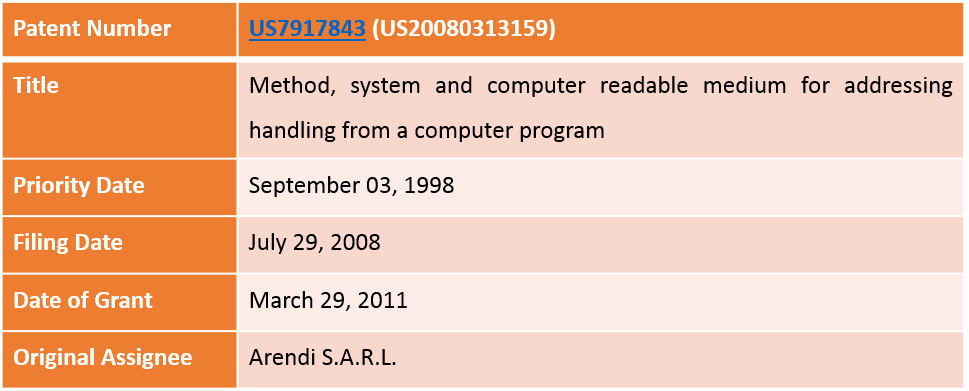Introduction What is Artificial Intelligence? Creating computer systems capable of carrying out activities that need…
Only Common Sense Not Sufficient to Prove Obviousness Over Prior Art
Can the grant of patent be rejected on the obviousness criteria based only on common sense? This issue has been handled by United States Court of Appeals for the Federal Circuit in the case of ARENDI S.A.R.L., Appellant v. APPLE INC., GOOGLE INC., MOTOROLA MOBILITY LLC, Appellees, decided on August 10, 2016. On December 2, 2013, Apple Inc., Google, Inc. and Motorola Mobility LLC (collectively “Appellees”)) filed a petition for inter partes review (“IPR”) of U.S. Patent No. 7,917,843 (the “’843 patent”), which is owned by appellant Arendi S.A.R.L. (“Arendi”). On June 9, 2015, the Patent Trial and Appeal Board (“Board”) issued a decision finding claims 1-2, 8, 14-17, 20-21, 23-24, 30, 36-39, and 42-43 would have been obvious.
Details of the patent at issue:
This patent is related to a method, system and computer readable medium for name and address handling, and more particularly to a touch screen, keyboard button, icon, menu, voice command device, etc. provided in a computer program, such as word processing program, spreadsheet program, etc., and coupled to an information management source for providing address handling within a document created by the computer program.
The parties agreed that claim 1 of the ’843 patent is representative of the claims on appeal.
Claim 1:
Claim 1 has been reproduced below for the A computer-implemented method for finding data related to the contents of a document using a first computer program running on a computer, the method comprising:
displaying the document electronically using the first computer program;
while the document is being displayed, analyzing, in a computer process, first information from the document to determine if the first information is at least one of a plurality of types of information that can be searched for in order to find second information related to the first information;
retrieving the first information;
providing an input device, configured by the first computer program, that allows a user to enter a user command to initiate an operation, the operation comprising (i) performing a search using at least part of the first information as a search term in order to find the second information, of a specific type or types, associated with the search term in an information source external to the document, wherein the specific type or types of second information is dependent at least in part on the type or types of the first information, and (ii) performing an action using at least part of the second information;
in consequence of receipt by the first computer program of the user command from the input device, causing a search for the search term in the information source, using a second computer program, in order to find second information related to the search term; and
if searching finds any second information related to the search term, performing the action using at least part of the second information, wherein the action is of a type depending at least in part on the type or types of the first information.
The sole prior art reference on appeal was U.S. Patent No. 5,859,636 to Pandit (“Pandit”). Pandit was filed on December 27, 1995, and teaches recognizing different classes of text in a document and providing suggestions based on it.
Arendi had sued Appellees and several other technology companies alleging infringement of claims of the ’843 patent and related patents. Appellees responded by filing a petition requesting an IPR of claims 1-44 of the ’843 patent. The Board instituted review of claims 1, 2, 8, 14-17, 20, 21, 23, 24, 30, 36-39, 42, and 43, and declined to institute review of the other challenged claims.
PTAB found that it would have been obvious, as a matter of common sense, to modify Pandit to include the required preliminary step of searching for the identified number in the address book in order to avoid multiple entries of the same address.
The single question at issue at Federal Circuit was whether the Board misused “common sense” to conclude that it would have been obvious to supply a missing limitation in the Pandit prior art reference to arrive at the claimed invention. Federal Circuit agreed that common sense and common knowledge have their proper place in the obviousness inquiry.
According to the Federal Circuit, the Appellees failed to show why it would be common sense for the “Add to address book” function to operate by first searching for entries with the same telephone number.
Federal circuit observed that Rather than clearly explaining with concrete examples what benefit searching for entries with the same number would achieve, Appellees keep returning to their general mantra that Arendi’s argument against searching for a number would apply equally to a search based on a name. Yet the burden is Appellees’ to provide more than a mere scintilla of evidence of the utility of a search for a telephone number before adding the number to an address book, where such a search is not “evidently and indisputably within the common knowledge of those skilled in the art.
Federal circuit observed that reasoned analysis and evidentiary support are important in obviousness analysis.
About the Author: Swapnil Patil, Patent Associate at Khurana & Khurana, Advocates and IP Attorneys and can be reached at: swapnil@khuranaandkhurana.com.




